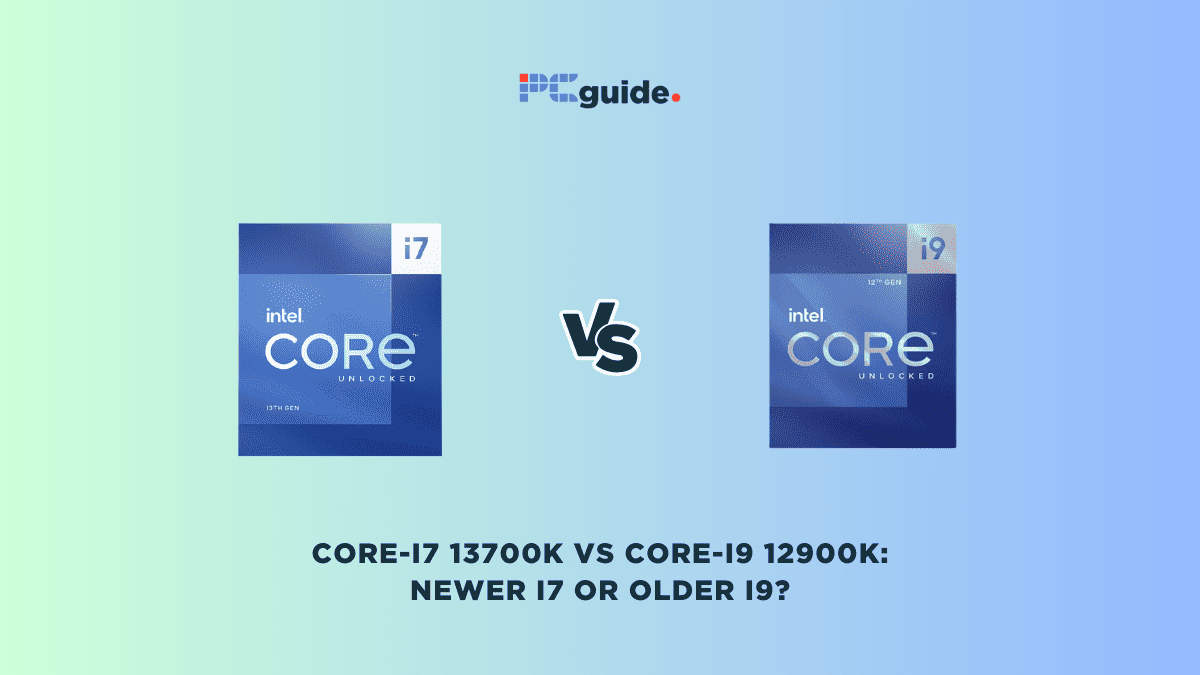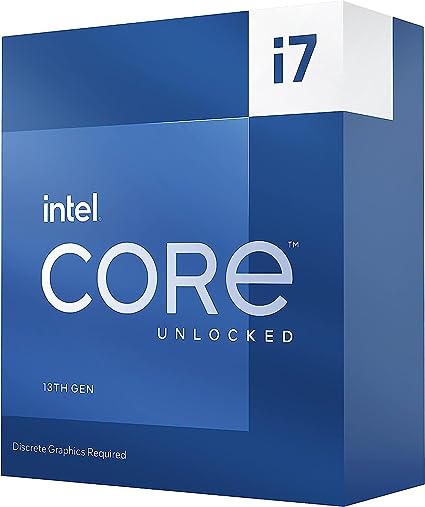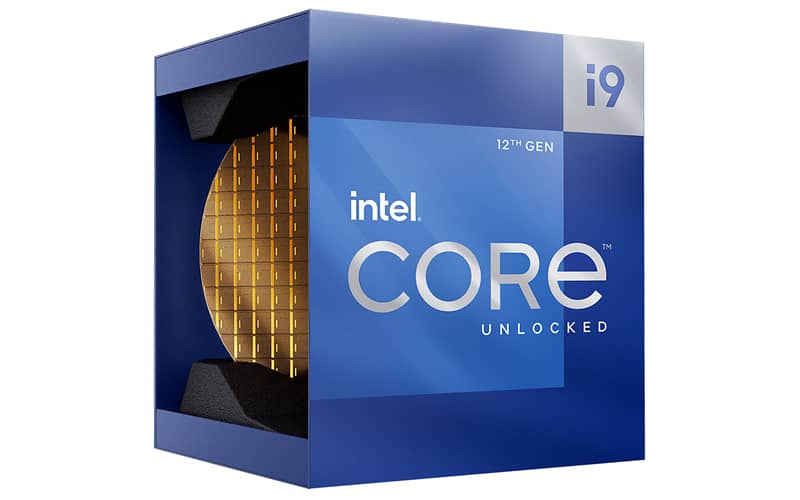Core-i7 13700K vs Core-i9 12900K: Newer i7 or older i9?

Table of Contents
The debate of Core-i7 13700K vs. Core-i9 12900K captures the essence of modern CPU comparisons, particularly when choosing between different generations of Intel Core processors. The 13th-generation Intel Core, notably the Core i7-13700K, brought significant upgrades in performance and features. Yet, the 12th-generation Alder Lake’s Core-i9 12900K continues to hold a strong position in the market.
This guide delves into a detailed comparison, assessing whether the older i9 still stands tall against the newer i7, a question crucial for anyone building a new PC or upgrading their hardware components. We’ll explore their capabilities in various scenarios, from raw processing power to PCIE support, to help you make an informed decision.
Core-i7 13700K vs. Core-i9 12900K: Specs comparison
The similarities between the Core i7 13700K and Core-i9 12900K are striking, particularly when scrutinizing their core and thread counts. Both CPUs boast 8 Performance Cores (P-Cores) and 8 Efficient Cores (E-Cores), culminating in an impressive 24 threads.
Beyond the core and thread counts, the Core i7 13700K notably improves, particularly in clock speeds. With P-Cores and E-Cores clocked 200-300 MHz higher than its predecessor, the 13700K promises enhanced performance during intensive and background applications.
It’s crucial to note that the L3 cache remains unchanged between the two processors. While the 13700K showcases a superior cache in some aspects, the L3 cache remains consistent, maintaining parity with the 12900K. However, one standout advantage of the 13700K lies in its L2 cache, which is double that of the 12900K. With an additional 6MB of L2 cache, the 13700K aims to deliver improved data access speeds, potentially influencing overall system responsiveness.
The Core i7 13700K exhibits superior maximum memory bandwidth at 89.6 GB/s compared to the Core-i9 12900K’s 76.8 GB/s. However, both processors share a 125W Thermal Design Power (TDP), indicating comparable power efficiency under normal operating conditions.
| Specification | Core-i7 13700K | Core-i9 12900K |
|---|---|---|
| Processor Architecture | Raptor Lake | Alder Lake |
| Performance Cores | 8 (P-cores) | 8 (P-cores) |
| Efficiency Cores | 8 (E-cores) | 8 (E-cores) |
| Total Threads | 24 | 24 |
| Base Clock Speed | 3.4 GHz | 3.2 GHz |
| Boost Clock Speed | Up to 5.4 GHz | Up to 5.2 GHz |
| L3 Cache Memory | 30 MB (shared) | 30 MB (shared) |
| DDR Memory Support | DDR4 and DDR5 | DDR4 and DDR5 |
| Maximum Supported RAM Speed | 5,600 MT/s | 4,800 MT/s |
| Maximum Memory Bandwidth | 89.6 GB/s | 76.8GB/s |
| Thermal Design Power (TDP) | 125 W | 125 W |
| Processor Socket | LGA 1700 | LGA 1700 |
| Price | $409 | $599 |
Motherboard and chipset compatibility
Motherboard and chipset compatibility is vital for maximizing CPU performance. Both CPUs are compatible with Z690, Z790, B760, and B670 motherboards. This factor is crucial when considering an upgrade or building a new PC.
Integrated GPU (iGPU) and memory channels
The integrated GPU (iGPU) and memory channels also play a role in overall performance. While both CPUs boast capable iGPUs, the efficiency of memory channels can impact data processing speeds and multitasking capabilities.
Power consumption
In terms of power consumption, the Core i7 13700K and Core i9 12900K have similar profiles. It’s essential to consider the power requirements and thermal output when selecting a CPU, as this can influence cooling solutions and overall system stability.
Core-i7 13700K vs. Core-i9 12900K: Performance showdown
When comparing the performance of Core i7 13700K and Core i9 12900K, several factors come into play, including clock speeds, chipset compatibility, and power consumption.
Clock speeds and chip performance
The Core i7 13700K has a higher base frequency for its performance cores at 3.40 GHz, peaking at 5.40 GHz. The Core-i9 12900K, however, starts at a slightly lower 3.2 GHz with a boost clock of 5.2 GHz. These differences are significant in single-threaded tasks and gaming performance.
Benchmarking results
Here’s a comparison of their key performance specifications, including publicly available results:
| Benchmark | Core-i7 13700K | Core-i9 12900K |
|---|---|---|
| CPU Mark | 46,704 | 41,402 |
| CPU Mark (single thread) | 4,379 | 4,187 |
Benchmark results show the Core i7 13700K outperforming the Core i9 12900K. In Geekbench V6, the Core i7 13700K could score around 2940 in single-core and 18714 in multi-core tests, 6% and 8% higher than the Core i9 12900K’s scores of 2777 and 17334, respectively. PassMark tests will echo this, with the Core i7 13700K showing 5% and 13% better performance in single and multi-core tests.
Core-i7 13700K vs. Core-i9 12900K: Price and value
When comparing the Core-i7 13700K and Core-i9 12900K, pricing is a crucial factor. The Core-i7 13700K stands as the more budget-friendly option, priced at $409. This price point makes it an appealing choice for users who want high performance without breaking the bank. Conversely, the Core-i9 12900K carries a heftier price tag of $599. This premium reflects its advanced specifications and capabilities, making it suitable for users who prioritize top-tier performance, especially in graphics-intensive tasks.
Impact on graphics performance
The Core-i9 12900K, with its higher price, offers enhanced performance in graphics-related tasks, a critical consideration for gaming or professional graphics work. This capability is particularly relevant in Q4 or November releases of games and software, where the latest tech can significantly enhance the experience.
Pricing comparison table
| Feature | Core-i7 13700K | Core-i9 12900K |
|---|---|---|
| Price (MSRP) | $409 | $599 |
| Performance tier on release | Enthusiast | Premium |
| Ideal for | Balanced Performance | Graphics Intensive Tasks |
| Budget Friendliness | More Affordable | Premium Priced |
Final verdict
Showing better performance and coming at an affordable price, Core i7 13700K is the processor that we would recommend. It offers a perfect blend of affordability and performance, exactly what a gamer or PC enthusiast should look for when choosing a processor. Moreover, the Core i7 13700K also offers 5.36% faster CPU speed and 800MHz higher RAM speed.

